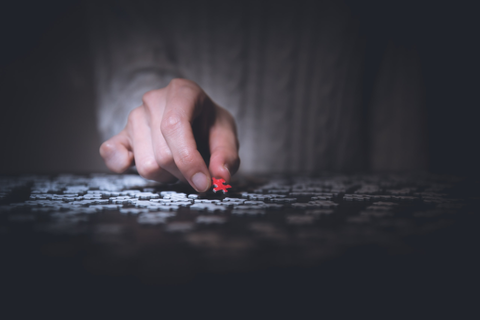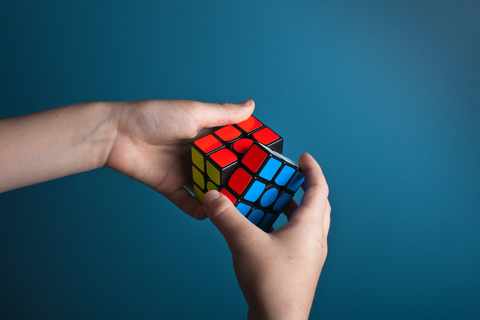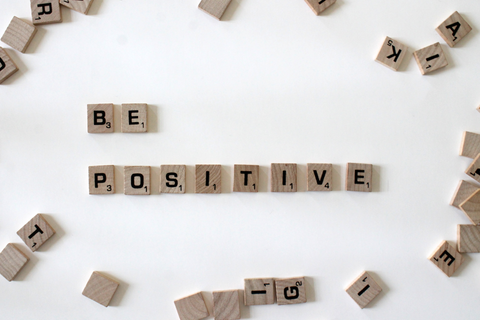Whether you are a big fan of puzzles or if you're just beginning to become curious about why so many people are invested in this activity, read on to find out the surprising benefits of puzzle-solving for grown-ups.
Benefits of Puzzle Solving for Adults
Better Memory
When we are solving puzzles, we are reinforcing current connections between our brain cells, also known as neurons. This activity increases the number of new relationships between the cells. In layman's terms, this means that we are enhancing the speed of our thought processes and mental equity.
They are especially good for enhancing short term memory. This is the type of memory that helps us recall colors and shapes and look at the bigger picture to figure out how the entire puzzle fits together.
Improved Problem Solving
By solving problems creatively and thinking critically, we can be perceived as valuable members of the workforce. These skills can be significantly honed and developed through puzzle solving.
Puzzles require us to look at different ways to solve a problem. A lot of trial and error is involved. In doing so, we learn the importance of coming up with theories, testing our hypotheses, and changing our perspective whenever something doesn't quite work out. Applying these skills to our work and career can create innovative and game-changing experiences for us.

Visual-Spatial Reasoning
Solving a puzzle requires you to take a look at the different pieces and find out how they fit into the larger picture. Regularly practicing this exercise can help enhance your visual-spatial reasoning. This skill helps with different daily tasks such as driving, organizing, using maps, and more. This particular ability is also highly important in certain industries and fields such as engineering, architecture, chemistry, surgery, and even art.
Educational Benefits
Puzzle games such as crossword puzzles are also helpful in developing great vocabulary. They are effective in improving research, spelling, and language skills - often without us even noticing. The skill is applicable to all ages. You can never be too old to learn new phrases and words - and puzzles are a really fun way to do that.
IQ Points Booster
Doing puzzles can improve vocabulary, memory, logic, and reasoning. It’s not very surprising that another benefit of puzzle-solving is possibly raising your IQ. In a University of Michigan research, a researcher found that grown-ups can boost their IQ by up to four points if they spend at least 25 minutes playing puzzles everyday.
Patients with Dementia and Alzheimer’s
Whether you care about improving your IQ or not, the fact that you are keeping your brain active with puzzles can have significant memory benefits for you. This is very advantageous in delaying symptoms of certain degenerative mental conditions such as Alzheimer’s disease and dementia.
Studies tell us that keeping the brain active by puzzle-solving and other similar activities can significantly lower the amount of brain cell damage that usually takes place in patients with Alzheimer’s. It also improves the growth of new neurons and fortifies the existing connections between them.
There can also be a connection between how many years you have been playing puzzles regularly and the chances of developing Alzheimer’s. If these theories are true, then you can reduce or prevent the risks of developing this disease the sooner you do puzzles as a regular part of your life.

Better Mood
The most obvious benefit of puzzle-solving is how it increases our brain's ability to produce dopamine. And while we cannot actually see and visualize this production, the effects can be felt almost immediately. Dopamine is responsible for improving our concentration, memory, motivation, and even feelings of optimism.
The neurotransmitter is released every time we finish a puzzle successfully, or even if we just get one piece in the right place. It urges us to keep on working on the puzzle and challenge ourselves until we get it right.
Managing Stress Levels
It might sound contradictory for a puzzle to reduce stress levels since they are usually challenging. However, puzzles have been proven to help us relax. The human brain has a beta state, also known as the wakeful state. This is the counterpart of our alpha state, or the ‘dreamful’ state. Both are helpful when solving problems.
By promoting relaxation, we receive a shift in consciousness which can lead to different benefits such as improving our overall mindset, the ability to create deeper connections, improving mood, relieving stress, and increasing our self-confidence.
Attention to Detail
Trying to solve a puzzle, particularly a jigsaw puzzle, involves attention to detail especially if you have a puzzle with very tiny pieces. You have to train your eyes to sort out the slightest differences in shapes and colors in order to put everything together. Being able to pick up on the small details can help not just in puzzle solving but in almost every aspect of our lives, including work. Being more detail-oriented and precise can improve the quality of our work and career.

Productivity
Being stress-free and happy lets us focus more easily. When we have a high level of concentration, we can also greatly improve our productivity whether at home or at work. For instance, if you are struggling to focus on a task at work or in school, it helps to take a short break. Consider doing a puzzle and help reset your brain, helping it to refocus.
In fact, a lot of offices around the world are starting to include puzzle games in their breakrooms. Doing puzzles allow their employees to take their minds off their tasks for a little while, coming back refreshed and ready to jump back into their work.
Collaboration
Another reason to incorporate puzzles in the office setting is its ability to build collaboration between employees. Research conducted at Yale University revealed that allowing people the opportunity to collaborate together to solve puzzles can improve relationships, their abilities to work together, and finishing tasks.

Family Bonding
Finally, if you are among the many people who are quarantined with their family or friends during this time, puzzle solving can provide a fun and relaxing activity that you can share. You can reap all of the benefits mentioned above while also spending quality time with the people who are with you.
We hope this article has come at a good time for you. Sending our love virtually to everyone out there. Remember to keep safe and healthy, and to not forget about your mental health during this time.
References:
https://www.mind.org.uk/need-urgent-help/how-can-i-distract-myself/games-and-puzzles/
https://www.goodnet.org/articles/7-surprising-ways-puzzles-are-good-for-your-brain
https://www.theguardian.com/lifeandstyle/2018/oct/13/mental-exercises-to-keep-your-brain-sharp
